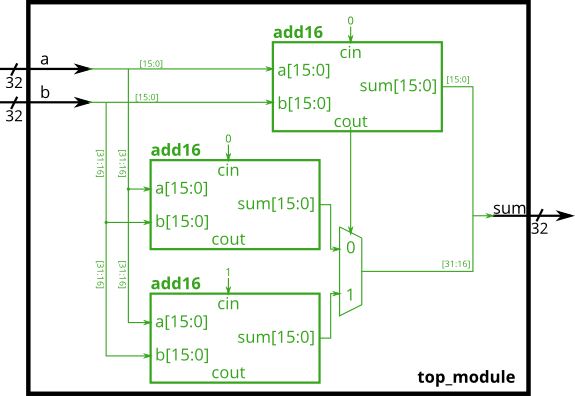Module cseladd
Problem Statement
One drawback of the ripple carry adder (See previous exercise) is that the delay for an adder to compute the carry out (from the carry-in, in the worst case) is fairly slow, and the second-stage adder cannot begin computing its carry-out until the first-stage adder has finished. This makes the adder slow. One improvement is a carry-select adder, shown below. The first-stage adder is the same as before, but we duplicate the second-stage adder, one assuming carry-in=0 and one assuming carry-in=1, then using a fast 2-to-1 multiplexer to select which result happened to be correct.
In this exercise, you are provided with the same module add16 as the previous exercise, which adds two 16-bit numbers with carry-in and produces a carry-out and 16-bit sum. You must instantiate three of these to build the carry-select adder, using your own 16-bit 2-to-1 multiplexer.
Connect the modules together as shown in the diagram below. The provided module add16 has the following declaration:
module add16 ( input[15:0] **a**, input[15:0] **b**, input **cin**, output[15:0] **sum**, output **cout** );
My Solution
module top_module(
input [31:0] a,
input [31:0] b,
output [31:0] sum
);
reg [15:0] sum1;
reg [15:0] sum2;
reg [15:0] sum3;
wire cout1;
add16 u_add16_1 (
.a(a[15:0]),
.b(b[15:0]),
.cin(0),
.sum(sum1),
.cout(cout1)
);
add16 u_add16_2 (
.a(a[31:16]),
.b(b[31:16]),
.cin(0),
.sum(sum2),
.cout()
);
add16 u_add16_3 (
.a(a[31:16]),
.b(b[31:16]),
.cin(1),
.sum(sum3),
.cout()
);
assign sum = {cout1 ? sum3 : sum2, sum1};
endmodule
